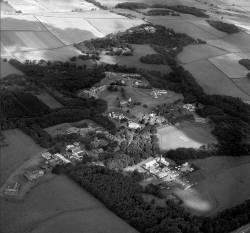Bangour Village Hospital
| Bangour Village Hospital | |
|---|---|
 | |
| Established | 1894 |
| Construction Began | 1898 |
| Opened | 1906 |
| Closed | 2004 |
| Current Status | Closed |
| Building Style | Cottage Plan |
| Architect(s) | Hippolyte J Blanc |
| Location | Dechmont,West Lothian |
| Architecture Style | Scots Renaissance |
| Alternate Names |
|
History[edit]
The hospital was built by the well-known Edinburgh architect Hippolyte J Blanc as a result of a competition begun in 1898. The Edinburgh Lunacy Board had concluded that a new psychiatric hospital was required to cater for the increasing numbers of patients from Edinburgh and the hospital was opened in 1906, with some of the buildings still to be completed. It was designed with no external walls or gates. The utility buildings were positioned at the centre of the site, the medical buildings for patients requiring medical supervision and treatment were to the E and there were villas to the W of the site which could accommodate patients who required less supervision and were able to work at some sort of industry. The complex also included a farm to the NW (not part of current site) and had its own water and electricity systems and also had its own railway. The hospital was commissioned by the War Office in WWI for wounded soldiers and extra temporary structures were erected. Most of which were dismantled after the War although some timber ones were retained by the hospital. The railway too was dismantled in 1921. The patients returned in 1922. The hospital was commissioned again for WWII. At this time many temporary shelters were erected to the NW of the site and this became the basis of the Bangour General Hospital (now demolished).
The wider approach to mental health was changing, with advances in medication and an increasing emphasis on "care in the community" leading to the run down and closure of many traditional mental hospitals. This process ran its course at Bangour through the 1990s and into the early years of the current century, and the last patients left the hospital in 2004, almost exactly a century after the first arrived. The following year the site was used as the location for the film "The Jacket", starring Keira Knightley and Adrian Brody. Since then it has been in the news as the subject of planning interest for development as housing, incorporating all the listed buildings on the site, and as a location for police riot training: and for a while the local press were reporting the possibility that it might become an Islamic university, though like the proposed housing development this came to nothing.
Further Reading[edit]
Allmond, G (2017)'Liberty and the Individual:The Colony Asylum in Scotland and England' History of Psychiatry 28, 1 pp.29-43

